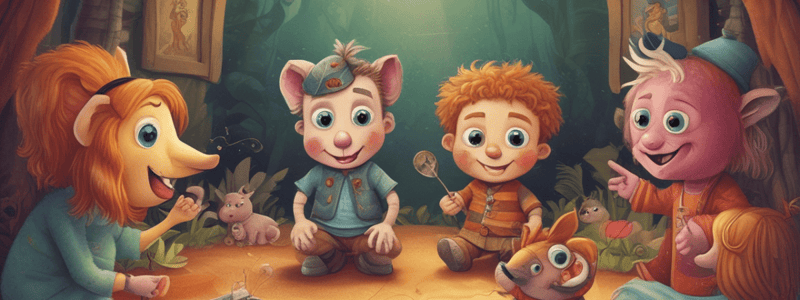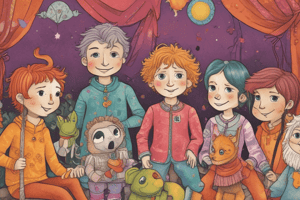Podcast
Questions and Answers
What is one of the primary benefits of using puppets in early childhood classrooms?
What is one of the primary benefits of using puppets in early childhood classrooms?
- To introduce diverse cultures and promote inclusivity
- To reduce feelings of self-consciousness in children (correct)
- To provide a medium for teachers to express themselves
- To enhance fine motor skills through puppet manipulation
How can puppets be used to support language development in young learners?
How can puppets be used to support language development in young learners?
- By providing a medium for teachers to correct grammar
- By introducing new vocabulary through written texts
- By encouraging verbal expression and dialogue (correct)
- By promoting silent reading activities
What is an additional benefit of using puppets in the classroom?
What is an additional benefit of using puppets in the classroom?
- To provide a dynamic and supportive learning environment (correct)
- To promote competition among children
- To reduce the amount of educational content delivered
- To increase the use of technology in the classroom
What is one way puppets can be used to enhance language skills in young learners?
What is one way puppets can be used to enhance language skills in young learners?
What is a result of using puppets to introduce new vocabulary in the classroom?
What is a result of using puppets to introduce new vocabulary in the classroom?
What is one of the benefits of using puppets for students who are learning English as a second language?
What is one of the benefits of using puppets for students who are learning English as a second language?
How can puppets help with vocabulary building?
How can puppets help with vocabulary building?
What aspect of language learning can puppets help improve through interactions?
What aspect of language learning can puppets help improve through interactions?
What is one way puppets can introduce cultural lessons to ESL students?
What is one way puppets can introduce cultural lessons to ESL students?
What is a result of the emotional connection students often develop with puppets?
What is a result of the emotional connection students often develop with puppets?
What is enhanced through the precise movements required to manipulate a puppet's small parts?
What is enhanced through the precise movements required to manipulate a puppet's small parts?
What do children learn to use to express feelings through puppet play?
What do children learn to use to express feelings through puppet play?
What is crucial for the development of physical coordination and the ability to perform tasks efficiently?
What is crucial for the development of physical coordination and the ability to perform tasks efficiently?
What do puppets help children understand through moving them in a defined play space?
What do puppets help children understand through moving them in a defined play space?
What is enhanced when children use puppets to convey emotions or actions?
What is enhanced when children use puppets to convey emotions or actions?
What is one way puppets can capture children's attention?
What is one way puppets can capture children's attention?
How can puppets sustain children's focus over longer periods?
How can puppets sustain children's focus over longer periods?
What is one way puppets can engage children in the storytelling process?
What is one way puppets can engage children in the storytelling process?
How can puppet activities be adapted to suit individual needs?
How can puppet activities be adapted to suit individual needs?
What do puppets appeal to in terms of learning styles?
What do puppets appeal to in terms of learning styles?
Flashcards are hidden until you start studying
Study Notes
Benefits of Puppets in Early Childhood Education
- Puppets captivate young learners' attention, making educational sessions more engaging and enjoyable, which helps keep children focused and eager to participate in learning activities.
- Puppets enhance language development by encouraging children to practice speaking and listening skills through interactive dialogue.
- Puppets support social-emotional growth, allowing children to express their emotions and explore social interactions in a safe and controlled environment.
- Puppets stimulate imagination, fostering creative thinking and problem-solving skills.
- Manipulating puppets enhances fine motor skills through the coordination required to control the puppet's movements.
- Puppets boost children's confidence, providing a medium through which they can express themselves more freely, reducing feelings of self-consciousness.
- Puppets can be used to introduce diverse cultures, promoting inclusivity and broad cultural awareness.
- Puppets can effectively reinforce educational content, as children often remember lessons delivered by these engaging characters better than those delivered through more conventional teaching methods.
Using Puppets to Enhance Language Development
- Puppets encourage verbal expression and dialogue, allowing children to engage in conversation and practice speaking skills.
- Puppets help introduce new vocabulary in a context that is engaging and understandable for children.
- Puppets can be used to create and perform stories, allowing children to practice constructing narratives and understand the structure of a story.
Puppets in ESL Settings
- Puppets help increase and improve classroom talk, creating a relaxed atmosphere that fosters communication.
- Puppets establish teacher-student and student-student interaction, making language practice more engaging and interactive.
- Puppets are especially beneficial for students who are learning English as a second language, helping them overcome the "silent phase" and build confidence in speaking.
- Puppets are excellent for role-playing exercises, allowing students to practice real-life situations where English is necessary.
- Puppets are effective for vocabulary building, introducing new words in a visually engaging and memorable context.
- Puppets enhance listening skills, as students need to focus and comprehend what is being said to interact appropriately.
- Puppets can introduce cultural lessons, demonstrating cultural norms and practices that enrich students' understanding of the language landscape.
- Puppets can create an emotional connection with students, boosting motivation and making them more eager to participate in learning activities.
Motor Skill Development through Puppets
- Manipulating puppets enhances fine motor skills, dexterity, and precision in children.
- Puppet play develops hand-eye coordination and spatial awareness in young children.
- Using puppets in a defined play space helps children understand spatial relationships and distances.
- Puppet play allows children to express emotions and actions non-verbally, enhancing non-verbal communication.
Puppets and Focus and Attention
- Puppets can capture and maintain children's attention through visual and emotional engagement techniques.
- Interactive dynamics and surprise elements in puppet play sustain focus and attention in children.
- Puppets can enhance concentration through interactive storytelling, making narratives more vivid and interesting.
- Puppet-based activities encourage active participation in multi-sensory experiences, engaging auditory, kinesthetic, and visual learners.
- Puppets can be adapted to suit individual needs, catering to diverse learning styles and abilities.
Studying That Suits You
Use AI to generate personalized quizzes and flashcards to suit your learning preferences.




